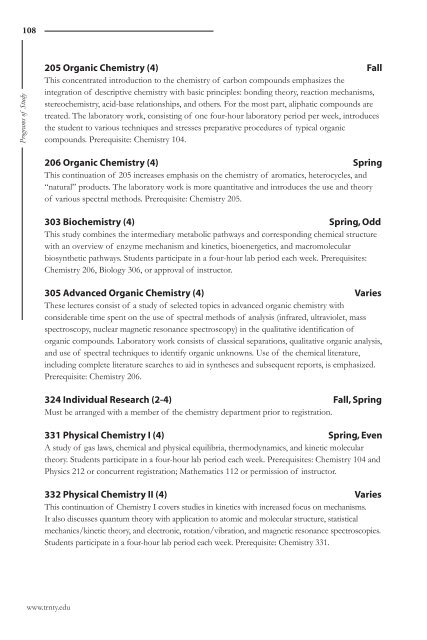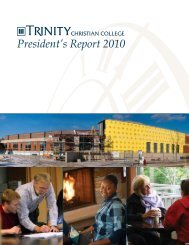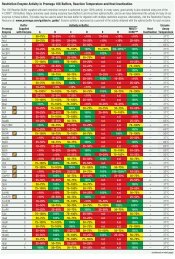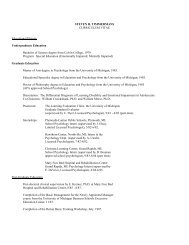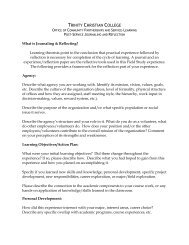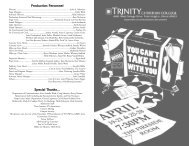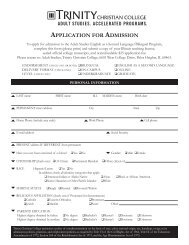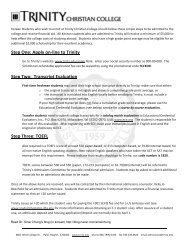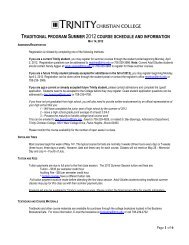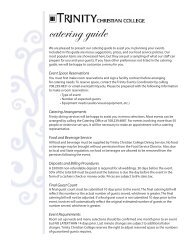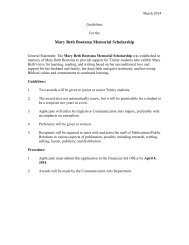College's catalog - Trinity Christian College
College's catalog - Trinity Christian College
College's catalog - Trinity Christian College
You also want an ePaper? Increase the reach of your titles
YUMPU automatically turns print PDFs into web optimized ePapers that Google loves.
108<br />
Programs of Study<br />
205 Organic Chemistry (4) Fall<br />
This concentrated introduction to the chemistry of carbon compounds emphasizes the<br />
integration of descriptive chemistry with basic principles: bonding theory, reaction mechanisms,<br />
stereochemistry, acid-base relationships, and others. For the most part, aliphatic compounds are<br />
treated. The laboratory work, consisting of one four-hour laboratory period per week, introduces<br />
the student to various techniques and stresses preparative procedures of typical organic<br />
compounds. Prerequisite: Chemistry 104.<br />
206 Organic Chemistry (4) Spring<br />
This continuation of 205 increases emphasis on the chemistry of aromatics, heterocycles, and<br />
“natural” products. The laboratory work is more quantitative and introduces the use and theory<br />
of various spectral methods. Prerequisite: Chemistry 205.<br />
303 Biochemistry (4) spring, Odd<br />
This study combines the intermediary metabolic pathways and corresponding chemical structure<br />
with an overview of enzyme mechanism and kinetics, bioenergetics, and macromolecular<br />
biosynthetic pathways. Students participate in a four-hour lab period each week. Prerequisites:<br />
Chemistry 206, Biology 306, or approval of instructor.<br />
305 Advanced Organic Chemistry (4) Varies<br />
These lectures consist of a study of selected topics in advanced organic chemistry with<br />
considerable time spent on the use of spectral methods of analysis (infrared, ultraviolet, mass<br />
spectroscopy, nuclear magnetic resonance spectroscopy) in the qualitative identification of<br />
organic compounds. Laboratory work consists of classical separations, qualitative organic analysis,<br />
and use of spectral techniques to identify organic unknowns. Use of the chemical literature,<br />
including complete literature searches to aid in syntheses and subsequent reports, is emphasized.<br />
Prerequisite: Chemistry 206.<br />
324 Individual Research (2-4) Fall, Spring<br />
Must be arranged with a member of the chemistry department prior to registration.<br />
331 Physical Chemistry I (4) Spring, Even<br />
A study of gas laws, chemical and physical equilibria, thermodynamics, and kinetic molecular<br />
theory. Students participate in a four-hour lab period each week. Prerequisites: Chemistry 104 and<br />
Physics 212 or concurrent registration; Mathematics 112 or permission of instructor.<br />
332 Physical Chemistry II (4) Varies<br />
This continuation of Chemistry I covers studies in kinetics with increased focus on mechanisms.<br />
It also discusses quantum theory with application to atomic and molecular structure, statistical<br />
mechanics/kinetic theory, and electronic, rotation/vibration, and magnetic resonance spectroscopies.<br />
Students participate in a four-hour lab period each week. Prerequisite: Chemistry 331.<br />
www.trnty.edu


